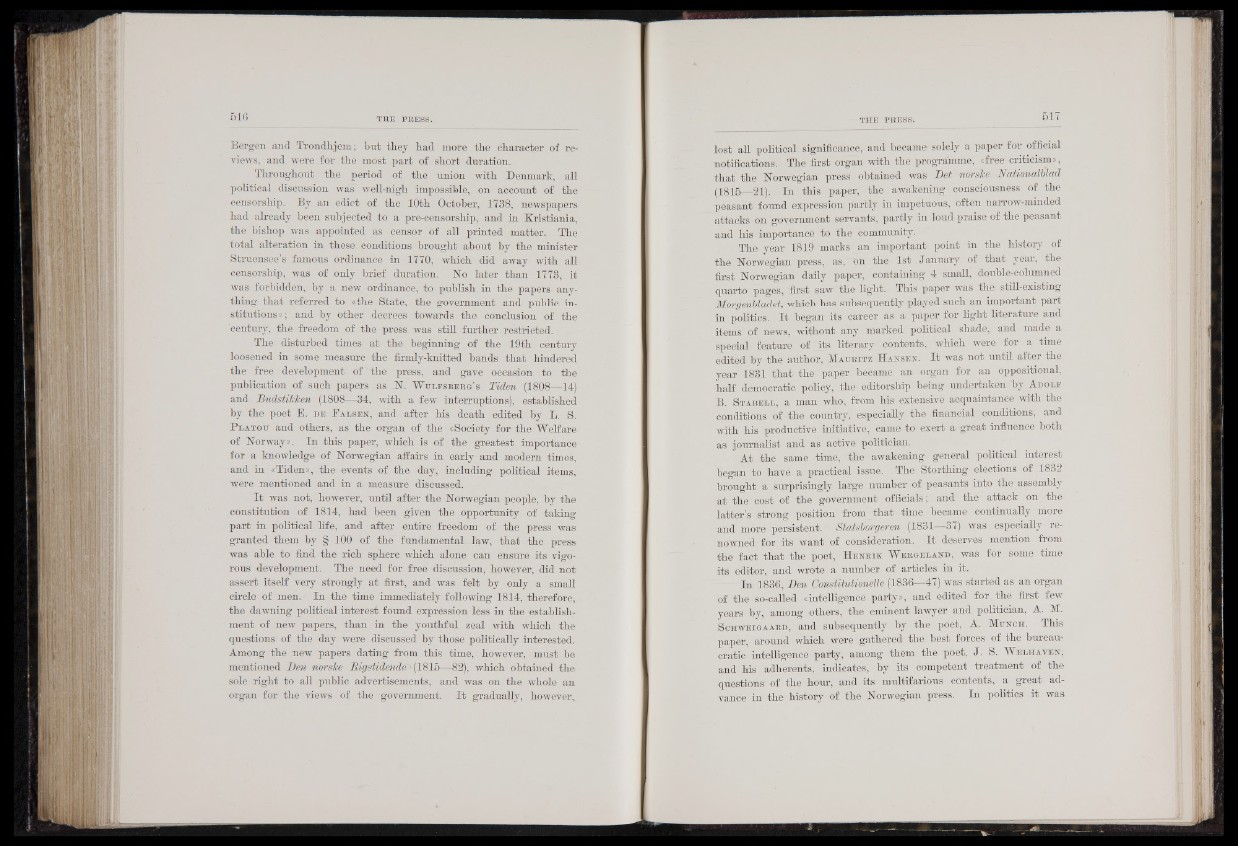
Bergen and Trondhjem ; but they had more the character of reviews,
and were for the most part of short duration.
Throughout the period of the union with Denmark, all
political discussion was well-nigh impossible, on account of the
censorship. By an edict of the 10th October, 1738, newspapers
had already been subjected to a pre-censorship, and in Kristiania,
the bishop was appointed as censor of all printed matter. The
total alteration in these conditions brought about by the minister
Struensee’s famous ordinance in 1770, which did away with all
censorship, was of only brief duration. No later than 1773, it
was forbidden, by a new ordinance, fo publish in the papers anything
that referred to «the State, the government and public institutions
»; and by other decrees towards the conclusion of the
century, the freedom of the press was still further restricted.
The disturbed times at the beginning of the 19th century
loosened in some measure the firmly-knitted bands that hindered
the free development of the press, and gave occasion to the
publication of such papers as N. W u l f s b e h g ’s Tiden (1808—14)
and BudstikTcen (1808—34, with a few interruptions), established
by the poet E. d e F a l s e n , and after his death edited by L. S.
P l a t o u and others, as the organ of the «Society for the Welfare
of Norway». In this paper, which is of the greatest importance
for a knowledge of Norwegian affairs in early and modem times,
and in «Tiden», the events of the day, including political items,
were mentioned and in a measure discussed.
I t was not, however, until after the Norwegian people, by the
constitution of 1814, had been given the opportunity of taking
part in political life, and after entire freedom of the press was
granted them by § 100 of the fundamental law, that the press
was able to find the rich sphere which alone can ensure its vigorous
development. The need for free discussion, however, did not
assert itself very strongly at first, and was felt by only a small
circle of men. In the time immediately following 1814, therefore,
the dawning political interest found expression less in the establishment
of new papers, than in the youthful zeal with which the
questions of the day were discussed by those politically interested.
Among the new papers dating from this time, however, must be
mentioned Ben norske Iiigstidende > (1815—82), which obtained the
sole right to all public advertisements, and was on the whole an
organ for the views of the government. I t gradually, however,
lost all political significance, and became solely a paper for official
notifications. The first organ with the programme, «free criticism»,
that the Norwegian press obtained was Bet norske Nationaltlad
(lg!5__21). In this paper,-the awakening consciousness of the
peasant found expression partly in impetuous, often narrow-minded
attacks on government servants, partly in loud praise of the peasant
and his importance to the community.
The year 1819 marks an important point in the history of
the Norwegian press, as, on the 1st January of that year, the
first Norwegian daily paper, containing 4 small, double-columned
quarto pages, first saw the light. This paper was the still-existing
MorgmUadet, which has subsequently played such an important part
in politics. I t began its career as a paper for light literature and
items of news, without any marked political shade, and made a
special feature of its literary contents, which were for a time
edited by the author, M a u r i t z H a n s e n . I t was not until after the
year 1831 that the paper became an organ for an oppositional,
half democratic policy, the editorship being undertaken 'by A d o l f
B. S ta b e l l , a man who, from his extensive acquaintance with the
conditions of the country, especially the financial conditions, and
with his productive initiative, came to exert a great influence both
as journalist and as active politician.
At the same time, the awakening general political interest
began to have a practical issue. The Storthing elections of 1832
brought a surprisingly large number of peasants into the assembly
at the cost of the government officials; and the attack on the
latter’s strong position from that time became continually more
and more persistent. Statsborgeren (1831 37) was especially renowned
for its want of consideration. I t deserves mention from
the fact that the poet, H e n r i k W e r g e l a n d , was for some time
its editor, and wrote a number of articles in it.
In 1836, Ben Constitutionelle (1836—47) was started as an organ
of the so-called «intelligence party», and edited for the first few
years by, among others, the eminent lawyer and politician, A. M.
S c h w e i g a a r d , and subsequently by the poet, A. M u n c h . This
paper, around which were gathered the best forces of the bureaucratic
intelligence party, among them the poet, J. S. W b l h a v e n ,
and his adherents, indicates, by its competent treatment of the
questions of the hour, and its multifarious contents, a great advance
in the history of the Norwegiap. press. In politics it was